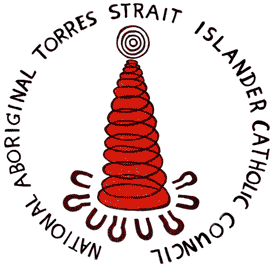
National Aboriginal and Torres Strait Islander Catholic Council
Aboriginal and Torres Strait Islander Sunday Resources
2020 NAIDOC Week Resource
We celebrated Aboriginal and Torres Strait Islander Sunday virtually in July, but why not celebrate again in NAIDOC week?
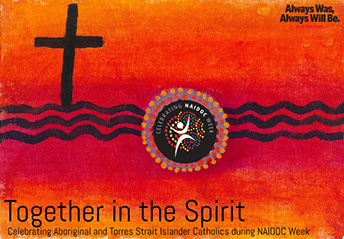 We have made some changes to the Resource released in July to help Parishes, Schools and organizations celebrate the contributions of Australia's First Peoples in the Catholic Church.
We have made some changes to the Resource released in July to help Parishes, Schools and organizations celebrate the contributions of Australia's First Peoples in the Catholic Church.
NAIDOC week was rescheduled to 8-15 November this year and we encourage all Catholics to take the opportunity to reflect, acknowledge and engage with First Nations Catholics.
Downloads:
Booklet - Web Version
Booklet - Print Version
The updated booklet includes:
- Liturgy Suggestions for both First Nations and non Indigenous Congregations
- Prayers of the Faithful developed by Aboriginal communities across Australia
- Homily Notes by Bishop Charles Gauci
- Tree of Life Youth Activity
- Acknowledgment and Welcome Guide
Aboriginal and Torres Strait Islander Sunday - July 2020
The COVID-19 pandemic has forced NATSICC to rethink the ways in how we empower Catholics to celebrate our special day. This year, we have modified our Aboriginal and Torres Strait Islander Sunday resources to work in a digital setting. We are also holding the first-ever live-streamed, Aboriginal and Torres Strait Islander Sunday Mass from the St Francis Xavier Cathedral in Adelaide from 11.30am EST. The livestream will be available from the NATSICC homepage.
We are inviting everyone around Australia - and the World - to join us on 5 July 2020, as we come ‘Together in the Spirit’ to celebrate the gifts of spirituality and culture.
Resource Booklet
- Full Aboriginal and Torres Strait Islander Sunday Resource Booklet
- Liturgy Suggestions for both First Nations and non Indigenous Congregations
- Prayers of the Faithful developed by Aboriginal communities across Australia
- Land: A Generation point for existence (Article by Clint McGoldrick)
- Homily Notes by Fr Frank Brennan
- Tree of Life Youth Activity
- Acknowledgment and Welcome Guide
Multimedia Resources
Torres Strait Islander Hymns
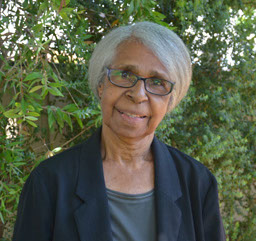 Written and performed by our very own Torres Strait Islands Councillor Dolly McGaughey, these beautiful hymns evoke the spirit of the Islands.
Written and performed by our very own Torres Strait Islands Councillor Dolly McGaughey, these beautiful hymns evoke the spirit of the Islands.
The Roman Catholic Church began its ministries in the Torres Strait when Pope Leo XIII requested that the Sacred Heart Fathers establish a Mission in New Guinea. It was decided among the Fathers that the setting up and servicing of such a Mission would be better facilitated if a site was chosen in the Torres Strait. Parishes are now established at (Sacred Heart) Thursday Island, (Holy Family) Horn island, (St Joseph the Worker's Church) Hammond Island and (St Stephen's) Bamaga.
Hymns
- To You Oh Lord (Entrance) | Arrangement
- We Bow in Your Name (Communion) | Arrangement
- Because he is God (Communion) | Arrangement
Aboriginal and Torres Strait Islander Sunday Poster
Developed at the 1995 NATSICC Leadership Gathering, this prayer maintains its relevance to this day.
Use this map to find your local Traditional Custodians for use in Acknowledgments
Acknowledgment of Country and presentation for use in Parishes and Schools
A 5 minute Acknowledgment and presentation that will set the scene for your Aboriginal and Torres Strait Islander Sunday Celebrations.
We know that COVID 19 restrictions have had a large impact on the way that we celebrate our faith as Catholics. It has made it more difficult to invite Aboriginal and Torres Strait Islander Elders to provide Welcomes, the numbers allowed at Mass are limited and many Parishes are still yet to open.
This resource contains 13 beautiful slides that will educate and inform your group whilst providing an Acknowledgment of Country in the event that you can't have a local Custodian present. In normal circumstances we always suggest that your local community normally be the first people contacted.
* Aboriginal and Torres Strait Islander viewers are advised that the video may contain images, voices or words of those that have passed.
Below are two options:
1. Click here to download the video( 350mb). This is the best option to ensure that you do not have issues during playback.
2. Click on the video to stream directly from Youtube.
Please note - to watch on full screen:
1. Click the Play icon in the middle of the image above
2. A menu bar will appear at the bottom of the video - the 'YouTube' icon will take you to YouTube itself. The icon on the furthest right (a square) will make the video play at full screen.
Bishop's Videos
Our Australian Catholic Bishops have walked alongside NATSICC for over 30 years and continue to do so today. We work closely with our own Bishops Commission - the Bishops Commission for Relations with Aboriginal and Torres Strait Islander Peoples - our goal being to share our gift of Spirituality with the wider Catholic Church and have those gifts fully embraced.
Below are some video messages to our communities and to the wider Catholic Church on the eve of our first ever live streamed national Aboriginal and Torres Strait Islander Sunday celebrations.
Homily Notes - Fr Frank Brennan
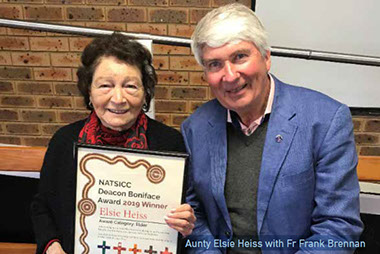 We gather ‘Together in the Spirit’ during the COVID-19 Pandemic and in the wake of riots and protests in the USA following upon George Floyd’s death under the knee of a white police officer. Here in Australia we have joined the chorus that ‘Black Lives Matter’, drawing attention yet again to the appalling statistics of Aboriginal deaths in custody.
We gather ‘Together in the Spirit’ during the COVID-19 Pandemic and in the wake of riots and protests in the USA following upon George Floyd’s death under the knee of a white police officer. Here in Australia we have joined the chorus that ‘Black Lives Matter’, drawing attention yet again to the appalling statistics of Aboriginal deaths in custody.
St Paul in his Letter to the Romans reminds us that our interests ‘are not in the unspiritual, but in the spiritual, since the Spirit of God has made his home’ in us. In the Uluru Statement from the Heart, Indigenous representatives told us that their ‘sovereignty is a spiritual notion: the ancestral tie between the land, or “mother nature”, and the Aboriginal and Torres Strait Islander peoples who were born therefrom, remain attached thereto, and must one day return thither to be united with our ancestors. This link is the basis of the ownership of the soil, or better, of sovereignty.’
Let’s hope that the 2017 Uluru Statement from the Heart can help to change hearts, providing a more secure place for Aboriginal and Torres Strait Islander peoples in the life of the Australian nation. At this eucharist, we gather in the hope expressed by the prophet Zechariah in today’s first reading when the Lord says: ‘He will proclaim peace for the nations. His empire shall stretch from sea to sea, from the River to the ends of the earth.’ Despite the chaos and uncertainty of these days, we gather, uplifted by the message of the Amazon Synod, and hoping for better times in our Church with the coming of the 2021 Plenary Council.
On this day 250 years ago, 5 July 1770, Captain Cook’s Endeavour was stranded in what was then named the Endeavour River undergoing repairs. Tupia the Tahitian navigator and the English botanist Joseph Banks were ashore looking at botanical specimens. But Tupia was happy to try out using a gun, hunting for wildlife. According to Banks’ journal, they encountered two natives ‘digging in the ground for some kind of roots; on seeing him they ran away with great precipitation’. The popular writer Peter Fitzsimons describes the ‘two natives peacefully collecting bush tucker as Tupia stands about them, gun brandished’. Tupia went on hunting, firing many shots at wildlife. What must the local Guugu Yimithirr people have thought? Their first encounter with foreign cultures – English and Tahitian. Their first sighting and sounding of a gun. What sort of beginning was this for coming ‘Together in the Spirit’ – the theme of our Aboriginal and Torres Strait Islander Sunday exactly 250 years later?
Today we hear those consoling words of Jesus, ‘Come to me all you who labour and are overburdened, and I will give you rest.’
After the Amazon Synod Pope Francis published his document Querida Amazonia in which he said (##20-21):
Efforts to build a just society require a capacity for fraternity, a spirit of human fellowship. Hence, without diminishing the importance of personal freedom, it is clear that the original peoples of the Amazon region have a strong sense of community. It permeates “their work, their rest, their relationships, their rites and celebrations. Everything is shared; private areas – typical of modernity – are minimal. Life is a communal journey where tasks and responsibilities are apportioned and shared on the basis of the common good. There is no room for the notion of an individual detached from the community or from the land”. Their relationships are steeped in the surrounding nature, which they feel and think of as a reality that integrates society and culture, and a prolongation of their bodies, personal, familial and communal:
“The morning star draws near, the wings of the hummingbirds flutter; my heart pounds louder than the cascade: with your lips I will water the land as the breeze softly blows among us”
All this makes even more unsettling the sense of bewilderment and uprootedness felt by those indigenous people who feel forced to migrate to the cities, as they attempt to preserve their dignity amid more individualistic urban habitats and a hostile environment. How do we heal all these hurts, how do we bring serenity and meaning to these uprooted lives? Given situations like these, we ought to appreciate and accompany the efforts made by many of those groups to preserve their values and way of life, and to integrate in new situations without losing them, but instead offering them as their own contribution to the common good.
On 12 February 2020, Archbishop Coleridge, President of the ACBC said: ‘Pope Francis’ focus on indigenous cultures in the Amazon speaks strongly to the Australian context.’ ‘It’s good that the Pope’s words on indigenous peoples come as we in this country consider the woeful lack of progress on closing the gap between Indigenous and non-Indigenous Australians in key areas.’ ‘The issues faced by many in the Amazon are not foreign to Australia, and the Holy Father’s words come as a challenge and encouragement to us too.’
The Plenary Council Discernment and Writing Groups have now issued their series of six Discernment Papers. The group asking how we might be more missionary and evangelising have said: ‘Nationally, we must forge deeper relationships with Aboriginal and Torres Strait Islander peoples, oppose any prejudice, and actively work for reconciliation.’ In today’s gospel, Jesus blesses his Father ‘for hiding these things from the learned and the clever and revealing them to mere children.’ This discernment group has laid down the challenge: ‘The Church in Australia must be shaped by Aboriginal and Torres Strait Islander culture and spirituality for it to be authentically a Church of this land. When the Church sinks its roots deep into Aboriginal and Torres Strait Islander culture, it will authentically be a Church in the land with a new vision and energy for mission.’
Another discernment group, asks how we might be more inclusive, participative and synodal, including ‘Aboriginal and Torres Strait Islander Catholics, who have not been well treated in Australian society and whose culture and spirituality was for so long unacknowledged, even though they have so much to contribute to the wider Church.’ They have proposed that Indigenous ‘contributions and concerns, expressed through the state and territory ministries and the National Aboriginal and Torres Strait Islander Catholic Council, should be joyfully received and acted upon at local and diocesan levels, particularly in relation to Reconciliation Action Plans, the recognition of language and culture, the identification and appropriate training of future Deacons and catechists, cross-cultural training for non- Indigenous ministers and measures to improve faith formation, employment and mental wellbeing.’
Another group discerning how our Church might be more humble, healing and merciful have spoken of a Church in Trauma. They have insisted on the need for us all to start at the beginning of the trauma in this land. ‘The first roots of our contemporary country Australia were founded in trauma. The double trauma of a penal colony of confinement and punishment meeting the subsequent subjugation of our First Nations peoples has been written into our identity as a nation. Aboriginal and Torres Strait Islander Australians are one of the most traumatised and disenfranchised peoples of the world. Our Church was present from these earliest times, and therefore carries these disturbing storylines in its history and identity.’ We recall the words of the Uluru Statement: ‘Proportionally, we are the most incarcerated people on the planet. We are not an innately criminal people. Our children are aliened from their families at unprecedented rates. This cannot be because we have no love for them. And our youth languish in detention in obscene numbers. They should be our hope for the future.’
We remember Pope John Paul II’s address at Alice Springs in 1986 when he told us: ‘You are part of Australia and Australia is part of you. And the Church herself in Australia will not be fully the Church that Jesus wants her to be until you have made your contribution to her life and until that contribution has been joyfully received by others.’
This discernment group has said, ‘The Uluru Statement from the Heart continues to echo these sentiments and a deep cry for healing. Humble listening will bring healing for the Aboriginal and Torres Strait Islander peoples. The principle of subsidiarity is key – the days of others deciding for them must be over. A new and real engagement, standing together in solidarity, is a merciful and humble way to a new pathway of healing.’
At this Eucharist, we come seeking the consolation of the Lord’s presence as we hear Jesus declare to us: ‘Shoulder my yoke and learn from me, for I am gentle and humble in heart, and you will find rest for your souls. Yes, my yoke is easy and my burden light.’
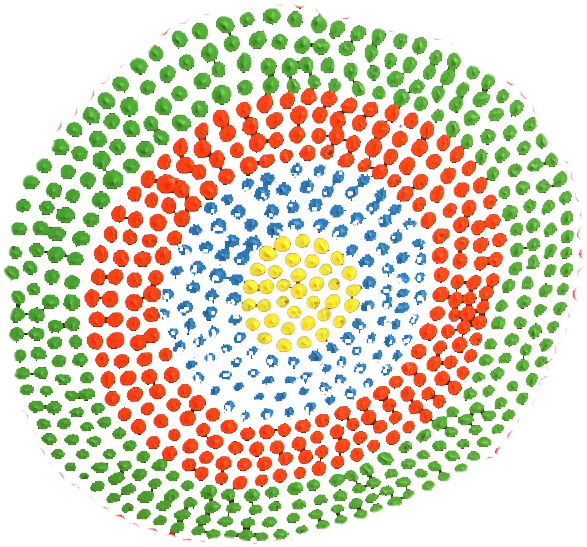
National Aboriginal and Torres Strait Islander Catholic Council
'The peak Indigenous advisory body to the Catholic Church'
80C Payneham Rd.
Stepney SA 5069
www.natsicc.org.au | craig@natsicc.org.au | 08 8363 2963
